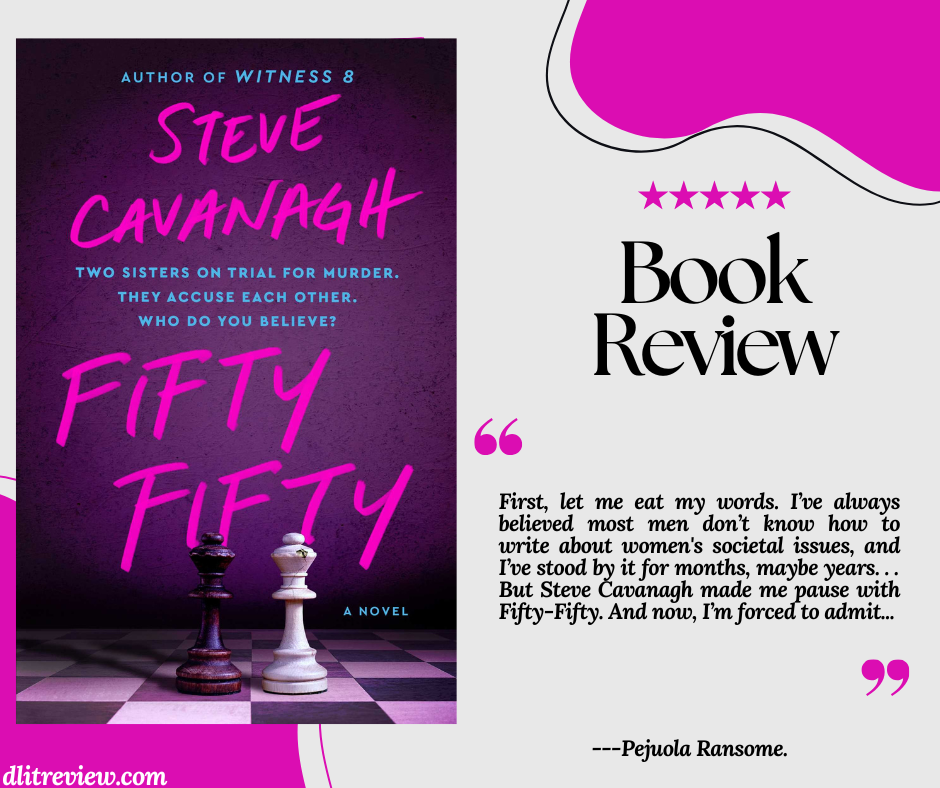First, let me eat my words. I’ve always believed most men don’t know how to write about women’s societal issues, and I’ve stood by it for months, maybe years. . . But Steve Cavanagh made me pause with Fifty-Fifty. And now, I’m forced to admit, this author not only knows how to write a story but can include subtle hints of feminism in it. And not just for any story, but a gripping, tense, legal thriller.
Fifty-Fifty is the fifth book in the Eddie Flynn series, but like the others, it is a standalone. Two sisters are on trial for the murder of their father. Both claim the other did it, and one of them is lying badly.
And there’s Eddie Flynn, the main character of the series, a con artist-turned-lawyer, and Kate Brooks, a new addition to the series, whose narration is a breath of fresh, feminist air, and is perfect for readers to explore the themes of misogyny and patriarchy. Their cases run parallel, their instincts clash, and there is a tension that the author never explores.
I find it amusing that this book is hyped and mostly popularised for its main plot (who could be the psychopath that murdered their father between two sisters?), and not for its subtle touches on themes of misogyny and racism. But who is to blame when Steve Cavanaugh delivered what he is known for? (A thrilling murder mystery book!). Multiple murders, in fact. Led by a psychopath whose identity isn’t revealed until the very end.
The multiple points of view were superb. The suspense, very intense. Cavanagh masterfully weaves three points of view: Eddie’s, Kate’s, the unnamed killer’s, and even sometimes, other minor characters, without losing clarity or momentum.
Every chapter is tension-filled, and just at the end of every chapter, when I decided to pick a side or thought I had it figured out, everything shifts in the next chapter. This was almost frustrating as I held my breath till the very end. But ultimately, it was worth it, and I was rewarded with a satisfying end.
Kate Brooks’ character is brilliant, layered, and her presence and her narration in the book make it impossible for the feminist undercurrent to be ignored.
I also appreciate how Cavanagh tackles misogyny in the legal profession, and as a man writing from a woman’s lens, he honestly does pretty well.
However, some conversations feel slightly unrealistic, especially around Kate’s storyline. At times, the men in her orbit are obviously too careless, lazy, and it chips away at the realism of a legal firm and the otherwise sharp courtroom scenes.
Some of the narration occasionally slips into a strange third-person tone, breaking away from the character’s perspective without warning. It doesn’t throw me off too much, but I can picture this being confusing for some readers.
A few parts are also rushed. Not like they hold major importance to the plot, but they could have done more, weighed more if they weren’t just glossed over.
It is also odd that a powerful judge, a recurring character in the series, is reduced to a consultant. It raised my eyebrows to see this strong character in the sequel turned into a background helper. Especially in the scenes where he creates a courtroom drama, clashes with the prosecutor, and passively with the new judge. The tension there hints at power play and racism. The character might have been trying to prove they were racist, subtly. Too subtle that it is quite easy to miss and move past the tension without a second thought.
Also, a recurring character from the sequel dies. Her death isn’t emotional or triggering, but it gutted me in some ways. Not just because she is smart and capable in her job. But it comes when Eddie begins to show romantic feelings towards her. But I think her death is, unfortunately, necessary for the plot.
One of the strongest underlying themes in Fifty-Fifty is the role of parenting in shaping people and, in this case, turning someone toward evil. The killer’s mother treats affection as a reward for achievement. Her expectations are brutal, and she makes her love feel conditional. Some children do well with this kind of pressure, but some turn out badly and, ultimately, evil. There is also the father who is passive and neglectful. He just might have known what was happening, but he refuses to confront it. Hence, his death.
Could the killer have turned out differently if they had received love without condition? If someone had seen them for who they really were before it was too late?
Overall, Fifty-Fifty is a satisfying, twist-filled thriller that handles its core themes: justice, misogyny, and power. It’s not triggering, not too heavy. But just with enough suspense and gaslighting moments to make a thriller. Perfect for a weekend vibe, and you should read it!


Alex